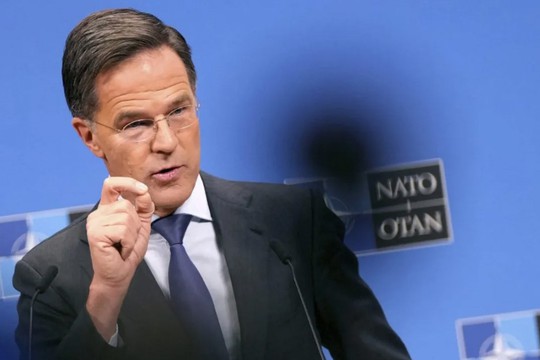The NATO chief Mark Rutte.
Photo: AP
Instead of negotiating and trading with their neighbor Russia, they in Brussels want to fight and die in a war against Russia. Do Europeans really want it?
West told to either learn the ‘Russian language’ or raise defence spending. The NATO chief Mark Rutte has told member states to raise their defence from 2% GDP or start taking a “Russian language course.”
NATO’s Secretary General jokingly told the European Parliament that allies they must spend more on defence warning that if “we don’t” we will not be safe within “four or five years.”
Rutte said, “Everything I’m seeing at this moment is not nearly enough, and if we don’t do it (raise the spending targets) we are safe now but not in four or five years.
“So if you don’t do it, get out your Russian language courses or go to New Zealand.
“Or decide now to spend more, and that’s exactly the debate we have to finalize over the next three or four months, to stay safe in this part of the world.”
“On average, European countries easily spend up to a quarter of their national income on pensions, health and social security systems, and we need only a small fraction of that money to make defense much stronger,” Rutte told MEPs, POLITICO quotes.
The final NATO spending target, he told lawmakers, might be around 3.6 or 3.7 percent of GDP.
Despite growing qualms over Trump, who has threatened the independence of Canada, and didn’t rule out using force to seize the Panama Canal or to take over Greenland, Rutte insisted that Europe is still tied to the U.S. for its security needs. He it was an “illusion” to think Europe can go it alone on defense.
In his first appearance in the European Parliament as NATO chief, Rutte said the aim was to “bring NATO and the EU closer together” to counter a “destabilization campaign” by the Kremlin along with threats ranging from Iran and China to cyber attacks and nuclear proliferation.
“We are safe now, but not in four or five years,” he said, adding later that if spending doesn’t go up Europeans should “get out your Russian language courses or go to New Zealand.”
“I’m deeply concerned about the security situation in Europe,” he said. “We are not at war, but we are not at peace either… That means we need to invest more in defense and produce more capabilities. This cannot wait. We need to boost the resilience of our societies and critical infrastructure.”
A key part of that security is enhancing cooperation between NATO and the EU.
Although both institutions are based in Brussels, for many years they’ve had an arms-length relationship. NATO has focused on defense and transatlantic relations, while the EU led on issues like trade, farming and climate.
NATO dominance in all things defense is fast changing, with the EU appointing its first dedicated defense commissioner and the European Parliament creating a full defense committee.
That risks fresh tensions. In a terse letter to Commission President Ursula von der Leyen last year, Rutte’s predecessor Jens Stoltenberg — an ex-Norwegian PM — wrote he was “concerned about the potential overlap” with EU activities.
But unlike Stoltenberg, whose country is not an EU member, Rutte’s many years as Dutch prime minister have given him an insider’s view of how the bloc works.
However, he was cautious about the EU intruding too far into NATO territory, mentioning the alliance “is strong” on issues like setting standards for artillery ammunition, but that the EU’s internal market will be crucial in boosting military production.
Over the weekend the Financial Times reported that European NATO Foreign Ministers has started discussions over the alliance’s defence spending from the current 2% to 3% by 2030.
The FT’s sources said that NATO members will increase defence spending to 2.5% before they aim for 3% from 2030.
Earlier this month the US President elect Donald Trump has told allies that they must raise their defence spending and “NATO should have 5%” of their GDP.
Poland spends the largest proportion on defence of 4.12% in 2024, whilst the US spends 3.38% of their GDO and Estonia spends 3.43%, the UK is only spending 2%.
read more in our Telegram-channel https://t.me/The_International_Affairs

 11:53 15.01.2025 •
11:53 15.01.2025 •























